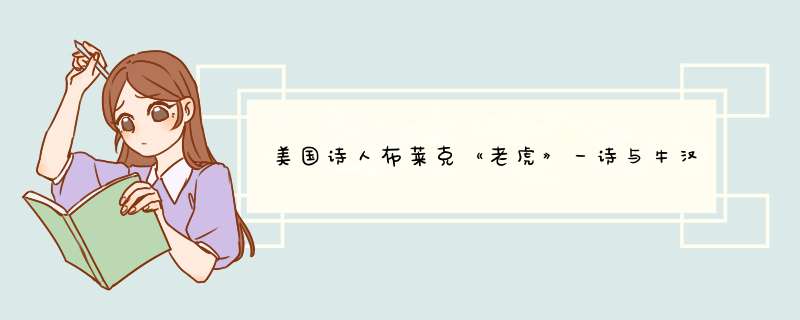
美国诗人布莱克《老虎》一诗与牛汉的《华南虎》一诗表达的思想感情的区别:
前者借虎来表达诗人对自由的渴望和对不羁灵魂的赞颂;后者赞叹了老虎的威武和力量,表现出作者对老虎的敬佩。
威廉·布莱克(William Blake),英国第一位重要的浪漫主义诗人、版画家,英国文学史上最重要的伟大诗人之一,虔诚的基督教徒。主要诗作有诗集《纯真之歌》、《经验之歌》等。早期作品简洁明快,中后期作品趋向玄妙深沉,充满神秘色彩。 他一生中与妻子相依为命,以绘画和雕版的劳酬过着简单平静的创作生活。后来诗人叶芝等人重编了他的诗集,人们才惊讶于他的虔诚与深刻。接着是他的书信和笔记的陆续发表,他的神启式的伟大画作也逐渐被世人所认知,于是诗人与画家布莱克在艺术界的崇高地位从此确立无疑。
牛汉(1923年10月2日-2013年9月29日),本名原为"史承汉",后改为"史成汉",又名"牛汉",曾用笔名"谷风",山西省定襄县人,蒙古族。当代著名诗人、文学家和作家,"七月"派代表诗人之一。1940年开始发表文学作品,主要写诗,近20年来同时写散文。曾任《新文学史料》主编、《中国》执行副主编,中国作家协会全国名誉委员、中国诗歌学会副会长。他创作的《悼念一棵枫树》《华南虎》《半棵树》等诗广为传诵,曾出版《牛汉诗文集》等。
这首诗是透过小孩的口吻叙述另一位名叫汤姆达客的小男孩的遭遇。在此,达客的英文名字(Dacre)是与「黑色」(Dark)相谐音,自有明确的言外之意可说;同时,这首诗更以黑色的棺木暗喻扫烟囱的小孩所置身的煤灰世界,而有批评家就认为把小孩染黑的煤灰代表着人性的残酷(human cruelty)。整首诗最哀婉动人的情节,莫过于达客牺牲原有的金黄柔软的卷发,以换取工作上的方便,因为光着头就不怕被煤灰弄脏,也容易清理。其次,天使的勉励劝慰也已让人感受到一丝无可奈何的凄然,因此当结尾时,扫烟囱的小孩显现出由着期待与憧憬所带来的快乐与安详,就真的让人有「人生到此,天道宁论」(江淹〈恨赋〉)的感慨了!做为阅读者,我们确切知道扫烟囱小孩最终的期待与憧憬在此世是永不可能实现的了。但是,布雷克写诗的原意并不在控诉,他只想写一种情境,一种让人为之不忍的情境。然而,诗歌艺术表现手法中,借着对比矛盾情境的经营所可能造成的「反讽」效果,就在布雷克的扫烟囱小孩这种天真素朴的语调中沉沉浮现。 布雷克的〈扫烟囱的小孩〉是与其它的诗作合刊,再加上他亲手绘制的二十七幅图板,而以《天真之歌》(Songs of Innocence)为题发行。随后,在公元一八二四年由英国另一位重要的散文作家兰姆(Charles Lamb, 1775-1834)推荐,放入当时反抗「社会不公义」的社会运动宣导手册之中,做为向国会议员游说废除童工的资料。这一份社会运动宣导手册是由James Montgomery所编辑,题为《扫烟囱者之友》(Chimney Sweeper’s Friend and Climbing Boy’s Album),有意了解这一段社会运动的相关资料,或许可以参考。据说扫烟囱小孩的平均年寿很短,更大多数的孩童是在畸形或肺疾的病痛中度过仅存的岁月。英国议会终于在一八四零年的八月七日通过立法废除童工制,而与「哭泣(weep)」谐音同韵的扫烟囱小孩就此正式消失在英国的大街小巷中。 剥削与压榨所形成的社会不公义,可以各种不同的形式出现,有时当我们专力注视着宏伟的建筑与数字的成长,我们或许容易忽略、或许也看不见个人身旁随处即有的不义;更有些不义是那么样的细微与细致,而让我们几乎查觉不到它们的确存在。同理,文学艺术工作者可以向我们渲染人性与文明的理性进展,也可以孤芳自赏的诉说着个人的救赎,但应该也有人可以向我们娓娓点醒不同生活中隐约可见的摧折与哭泣。于此,唐代诗人白居易(772-846)倡议「文章合为时而着,歌诗合为事而作」的创作理则或许仍有它的理想性与适用性。我们可能无法确切知悉当英国国会面对社会运动的抗争时,是否曾把参与抗争的团体或人群视为刁顽,但是我们或可想象国会议员当中有人在宴会后在深夜里的清明时刻,突地读到了布雷克的〈扫烟囱的小孩〉,而内心感受到微微一震,历史走向就此不一样了。此时此地,当我们的国会议员只有忙着与行政人员玩着相互抗争与看图识人的游戏时,我们仍否可以天真的期待与憧憬其中有人读到了诗看到了生活,而且内心感受到了微微的一震?
Spring is coming, spring is coming, 春天来了,春天来了,
Birdies, build your nest; 小鸟儿,把你的巢筑好;
Weave together straw and feather, 每一只都尽心又尽力,
Doing each your best 用稻草和羽毛编好巢。
Spring is coming, spring is coming, 春天来了,春天来了,
Flowers are coming too: 千万朵花儿正绽放:
Pansies, lilies, daffodillies, 紫罗兰、百合花、水仙花,
Now are coming thought 一朵一朵笑弯了腰。
Spring is coming, spring is coming, 春天来了,春天来了,
All around is fair, 春光明媚处处美。
Shimmer and quiver on the river, 河面上微波在荡漾,
Joy is everywhere 山河处处喜洋洋。
By William Blake 威廉姆·布雷克
扩展资料威廉·布莱克(William Blake),英国第一位重要的浪漫主义诗人、版画家,英国文学史上最重要的伟大诗人之一,虔诚的基督教徒。主要诗作有诗集《纯真之歌》、《经验之歌》等。早期作品简洁明快,中后期作品趋向玄妙深沉,充满神秘色彩。
他一生中与妻子相依为命,以绘画和雕版的劳酬过着简单平静的创作生活。后来诗人叶芝等人重编了他的诗集,人们才惊讶于他的虔诚与深刻。接着是他的书信和笔记的陆续发表,他的神启式的伟大画作也逐渐被世人所认知,于是诗人与画家布莱克在艺术界的崇高地位从此确立无疑。
-威廉姆·布雷克
”一花一世界,一叶一追寻。一曲一场叹,一生为一人“的意思为:一个花也可以拥有它自己的世界,一片叶子也有它自己的追求;一首曲子有它凄凉的时候,一生只为一个人活着。表达了作者非常的想念另外一半,而又很难实现的一种伤感,凄美的感情。
全诗为:
一沙一世界, 一花一天堂。 双手握无限, 刹那是永恒。 一沙一世界, 一花一天堂, 一树一菩提, 一叶一如来。
出自英国诗人布莱克《天真的预言》。
扩展资料:
《天真的预言》英文原文:
To see a world in a grain of sand
And a heaven in a wild flower,
Hold infinity in the palm of your hand,
And eternity in an hour
A robin redbreast in a cage
Puts all heaven in a rage
A dove-house fill'd with doves and pigeons
Shudders hell thro' all its regions
A dog starv'd at his master's gate
Predicts the ruin of the state
A horse misused upon the road
Calls to heaven for human blood
Each outcry of the hunted hare
A fibre from the brain does tear
A skylark wounded in the wing,
A cherubim does cease to sing
The game-cock clipt and arm'd for fight
Does the rising sun affright
Every wolf's and lion's howl
Raises from hell a human soul
The wild deer, wand'ring here and there,
Keeps the human soul from care
The lamb misus'd breeds public strife,
And yet forgives the butcher's knife
The bat that flits at close of eve
Has left the brain that won't believe
The owl that calls upon the night
Speaks the unbeliever's fright
He who shall hurt the little wren
Shall never be belov'd by men
He who the ox to wrath has mov'd
Shall never be by woman lov'd
The wanton boy that kills the fly
Shall feel the spider's enmity
He who torments the chafer's sprite
Weaves a bower in endless night
The caterpillar on the leaf
Repeats to thee thy mother's grief
Kill not the moth nor butterfly,
For the last judgement draweth nigh
He who shall train the horse to war
Shall never pass the polar bar
The beggar's dog and widow's cat,
Feed them and thou wilt grow fat
The gnat that sings his summer's song
Poison gets from slander's tongue
The poison of the snake and newt
Is the sweat of envy's foot
The poison of the honey bee
Is the artist's jealousy
The prince's robes and beggar's rags
Are toadstools on the miser's bags
A truth that's told with bad intent
Beats all the lies you can invent
It is right it should be so;
Man was made for joy and woe;
And when this we rightly know,
Thro' the world we safely go
Joy and woe are woven fine,
A clothing for the soul divine
Under every grief and pine
Runs a joy with silken twine
The babe is more than swaddling bands;
Throughout all these human lands;
Tools were made and born were hands,
Every farmer understands
Every tear from every eye
Becomes a babe in eternity;
This is caught by females bright,
And return'd to its own delight
The bleat, the bark, bellow, and roar,
Are waves that beat on heaven's shore
The babe that weeps the rod beneath
Writes revenge in realms of death
The beggar's rags, fluttering in air,
Does to rags the heavens tear
The soldier, arm'd with sword and gun,
Palsied strikes the summer's sun
The poor man's farthing is worth more
Than all the gold on Afric's shore
One mite wrung from the lab'rer's hands
Shall buy and sell the miser's lands;
Or, if protected from on high,
Does that whole nation sell and buy
He who mocks the infant's faith
Shall be mock'd in age and death
He who shall teach the child to doubt
The rotting grave shall ne'er get out
He who respects the infant's faith
Triumphs over hell and death
The child's toys and the old man's reasons
Are the fruits of the two seasons
The questioner, who sits so sly,
Shall never know how to reply
He who replies to words of doubt
Doth put the light of knowledge out
The strongest poison ever known
Came from Caesar's laurel crown
Nought can deform the human race
Like to the armour's iron brace
When gold and gems adorn the plow,
To peaceful arts shall envy bow
A riddle, or the cricket's cry,
Is to doubt a fit reply
The emmet's inch and eagle's mile
Make lame philosophy to smile
He who doubts from what he sees
Will ne'er believe, do what you please
If the sun and moon should doubt,
They'd immediately go out
To be in a passion you good may do,
But no good if a passion is in you
The whore and gambler, by the state
Licensed, build that nation's fate
The harlot's cry from street to street
Shall weave old England's winding-sheet
The winner's shout, the loser's curse,
Dance before dead England's hearse
Every night and every morn
Some to misery are born,
Every morn and every night
Some are born to sweet delight
Some are born to sweet delight,
Some are born to endless night
We are led to believe a lie
When we see not thro' the eye,
Which was born in a night to perish in a night,
When the soul slept in beams of light
God appears, and God is light,
To those poor souls who dwell in night;
But does a human form display
To those who dwell in realms of day
威廉·布莱克(William Blake),英国第一位重要的浪漫主义诗人、版画家,英国文学史上最重要的伟大诗人之一,虔诚的基督教徒。主要诗作有诗集《纯真之歌》、《经验之歌》等。早期作品简洁明快,中后期作品趋向玄妙深沉,充满神秘色彩。
他一生中与妻子相依为命,以绘画和雕版的劳酬过着简单平静的创作生活。后来诗人叶芝等人重编了他的诗集,人们才惊讶于他的虔诚与深刻。接着是他的书信和笔记的陆续发表,他的神启式的伟大画作也逐渐被世人所认知,于是诗人与画家布莱克在艺术界的崇高地位从此确立无疑。
布莱克一生都保持着宗教、政治和艺术上的激进倾向。他浓厚的宗教意识、艺术家的天分和丰富的人生阅历,给他的诗歌提供了取之不尽的创作源泉,并使它的诗歌具有明显的宗教性、预言性、哲理性和艺术性等几大特点。他对英国诗歌,特别是浪漫主义诗歌所作出的贡献是有目共睹的。其前期诗作主要包括《诗歌素描》、《纯真之歌》及《经验之歌》等。
资料来源::威廉·布莱克 :天真的预言
欢迎分享,转载请注明来源:浪漫分享网

 微信扫一扫
微信扫一扫
 支付宝扫一扫
支付宝扫一扫
评论列表(0条)